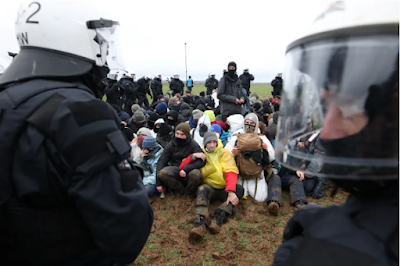Police in North Rhine-Westphalia have begun to remove protesters from the village of Lützerath, which is scheduled to be destroyed by an expansion of the Garzweiler Coal Mine. The twelfth century village was abandoned by its original occupants two years ago, following an unsuccessful legal battle against the mine's expansion, but the village was subsequently occupied by activists concerned about the levels of atmospheric pollution likely to be caused by extracting and burning the coal.
Coal, like other fossil fuels (hydrocarbons), can be burned to produce energy, producing carbon dioxide as a product. Atmospheric carbon dioxide absorbs energy from sunlight and releases it as light in the infrared part of the spectrum, which we encounter as heat (all gas molecules will tend to absorb energy then release it as light at a specific wavelength, the blue colour of the sky reflects the wavelength at which nitrogen, the majority component of the Earth's atmosphere, releases energy, while the red colour of sunsets and sunrises is caused by oxygen). This has become problematic as the huge amounts of fossil fuels burned by Human industry in the past two centuries have led to an increase in the proportion of carbon dioxide in our atmosphere, leading to global changes in climate.
Coal is a particularly troublesome fuel as the extraction process often involves clearing huge areas of ground surface, which are then unusable without significant remediation work, and releases large amounts of particulate matter, itself a pollutant which can cause lung disease, into the local atmosphere, as well as large quantities of methane, another greenhouse gas and the cause of many explosions and poison gas incidents in deep pit coal mines.
The Garzweiler Mine, like most coal mines in Germany produces brown lignite coal, which is a 'low maturity' coal, which has not been buried as deeply or for as long as other coals, and therefore is less pure than high maturity coals, which have had most of the non-carbon material squeezed out of them. In practice, this means that low maturity coals have a higher sulphur content than high maturity coals, which when the coal is burned forms sulphur dioxide gas, which can dissolve in water droplets suspended in clouds to form a dilute sulphuric acid, which falls as acid rain, adding to the negative environmental impact of using this coal as a fuel.
Due to this higher environmental impact, authorities in Germany had been looking to reduce the amount of coal mined and burned within the country, by switching to power generation methods with a lower environmental impact. Some of this alternative provision came in the form of renewable energy sources such as solar or wind power, but a lot of production was simply switched from coal to cheap natural gas (methane) imported with Russia. Following the Russian invasion of Ukraine in 2022, and the strong support that Germany offered to Ukraine during this crisis, supplies of gas reaching Germany were first reduced and then completely cut off, causing the German Government to return to coal use as a way of maintaining electricity generation.
RWE, the company which operates the mine, had been planning to remove Lützerath, and several other villages in the area, from the map for some years, although this plan was hampered by the country's political ambition to reduce greenhouse emissions and switch to cleaned energy. However, following the development of the Russian crisis, coal has come after consideration again, and following talks with RWE in October, the Robert Habek, the German minister for Economic Affairs and Climate Action, took the decision to allow RWE to excavate at Lützerath, although this was accompanied by a pledge to prevent the demolition of five other villages in the area, which RWE had hoped to remove, and the bringing forward of a goal to end all coal production in North Rhine-Westphalia from 2038 to 2030.
This news was met with great dismay by environmentalists in Germany and across Europe, who had hoped that Habek, a member of the Green Party serving in Olaf Scholz's coalition government, would resist calls to return to coal production as a way of meeting the country's energy needs.
Shortly after this, many additional protesters began to arrive at the site, joining the protesters already camped there, and improving on and extending the network of defences there. This was followed by a war of words between RWE, the German Federal Police, and the climate protesters, with the coal mining company claiming that the protesters are illegal squatters, while the protesters claim that the unfolding climate crisis justifies their actions.
On Monday 9 January 2023 a court gave the police permission to clear the site, and following a series of orders for the protesters to leave, they entered the village on Wednesday 11 January. The majority of the protesters agreed to leave peacefully once police entered the site, but some were less co-operative, barricading themselves inside buildings, or climbing trees and improvised structures to make themselves harder to remove. Witnesses have reported some protesters throwing rocks and bottles at the police, while the police claim to have also been attacked with petrol bombs.
See also...
Follow Sciency Thoughts on Facebook.
Follow Sciency Thoughts on Twitter.








